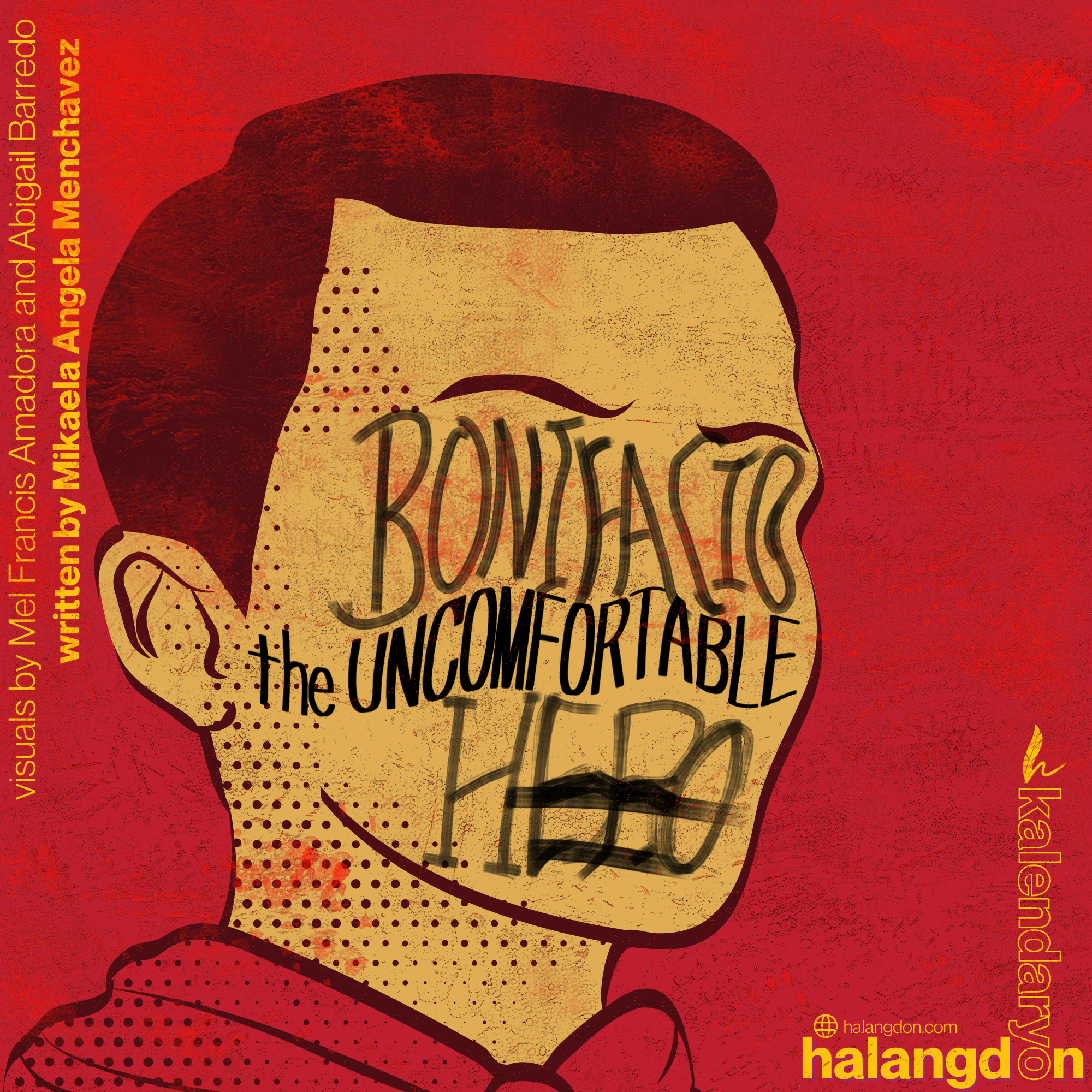
The Uncomfor-
table Hero
- Features
- November 30, 2024
- Mikaela Angela Menchavez
- visuals byAbigail Barredo, Mel Francis Amadora
In “Why Fell the Supremo?”, a part of his collection of essays titled “A Question of Heroes,” National Artist for Literature Nick Joaquin calls Andres Bonifacio an “uncomfortable hero.” This may be a jarring title to give, especially for the majority of Filipinos who view Bonifacio as the pioneer of revolution—the very essence of what it means to resist oppression. Yet, why did one of our National Artists dubb one of our heroes with such a shameful title?
In the same essay, Nick Joaquin gives an overview of Bonifacio beyond the legend he is commonly portrayed as in Araling Panlipunan books. He sees him as a deeply flawed individual who was always one step ahead, but not with much thought. While diving head first into battle leading the revolutionaries who held only bolos and an unbreakable resolve may sound honorable, it was far from practical, much less successful. In particular, stress is given to the fact that Bonifacio spent all of his enthusiasm on the battlefield that he could never allocate time to strategize on how to win. In actuality, most of Bonifacio’s attempts to reclaim our land turned out to be failures—Bonifacio, despite being the Father of the Philippine Revolution, lost almost all of his crusades.
Besides that, Bonifacio was nothing like his idol, Jose Rizal, who had patience, foresight, and even a tinge of pacifism. Similarly, Bonifacio was nothing like his rival Emilio Aguinaldo, who had wit, cunning, and class—precisely why the former neither wears the title of National Hero, nor the honor of being the first Philippine President, despite the protests of those who wish to change history.
Such is the truth; we can not alter history. We are only limited to understanding it. So let us, the people of today, do what we can to understand the people of yesterday.
Years before he would eventually lead the revolutionaries of Manila, Andres Bonifacio was just a boy from Tondo in a family of six children. His mother died shortly after giving birth to his youngest sister; when he was fourteen, his father died as well. An adolescent Andres then became the head of his family, working whatever jobs were offered to him to survive. He is, as Nick Joaquin writes, a “poor little boy with an eye for that room on the top.” From his early beginnings, Bonifacio might not have been the most learned boy, but he certainly made up for it through his loud stubbornness and unwillingness to succumb to everything that was holding him down.
There seems to be an evident theme when discussing the life of Andres Bonifacio: desperation. His most fatal error perhaps was desperation for power—however, we must remember that in any revolutionist, there once resided the desperation for change and independence. In a sense, revolution called for Bonifacio, someone who had the determination to cling on to life and to own what was rightfully his since the start. With this, we can view Bonifacio as an impoverished man who had owned little and could not even enjoy the little that he had in peace.
Our question then is this: was Bonifacio truly a hero? The delicate part about history is that most of the time when asking if a figure is good or evil, the answer will most likely be “it depends on which page of history you’re consulting.”
To some, Bonifacio was an arrogant brat who had a rough temper and let his ego triumph over his common sense. To others, he was the pillar of hope and resistance to those who, like him, had owned very little. Bonifacio is proof that heroes are, at the end of the day, men who are not exempt from fault or sin. However, just because this is true does not diminish the fact that Bonifacio is still a relevant figure in Philippine history.
There exist aggrieved and unwavering youth in our era who subtly resemble the Supremo—yet, unlike him, they refuse to fall. From the genocide of Palestinians at the hands of Israel to a convict winning the 2024 US Elections, and by the innumerable fights that we Filipinos have to endeavor as we suffer under an incompetent and unresponsive government that is indifferent to our needs, we persist—we resist. We, as rightful citizens, should be aware that there is a revolution to be ignited every time we realize that we have the right to demand better from those we have put in power.
Ultimately, Nick Joaquin was correct in calling Bonifacio an “uncomfortable hero,” for revolution was never made for those who were comfortable with what they had, especially when they knew they deserved more.
